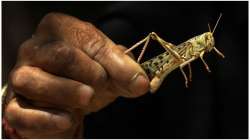US sends back imported shipment from India after spotting insect in it
In times of coronavirus, public health has become an important concern. A green rice leafhopper was found in a container of Aluminium billets sent from India

Coronavirus has had everyone's antennae up for a long time. The changes are visible for everyone to see. Just sneeze in a public place and passerbys will stare at you as if you've committed a capital crime. Everyone has their reasons of course. And in times of coronavirus, self-care is paramount. Public health has suddenly become an important area of concern worldwide.
It is not known whether this was the reason why this happened but the US authorities sent back a container imported from India after they spotted an insect in it. The imported container had aluminium billets in it and US Customs and Border protection officials found a green rice leafhopper in it.
The US Department of Agriculture confirmed that a Nephotettix Nigropictus (Cicadellidae), commonly known as a green rice leafhopper, was the first-ever discovery of this insect in the Delaware Valley in Pennsylvania.
The Customs and Border Protection (CBP) agriculture specialists discovered it in a container of aluminum billets from India on March 11.
“The container was ordered re-exported,” the CBP said.
Additionally in May, the specialists discovered five wood borers, including a live immature Cerambycidae larva inside wood dunnage in a container of steel structures from Italy.
They also found a live immature Cerambycidae larva on May 13 inside wood dunnage in a container of steel from Switzerland; two live adult
Cerambycidae insects on May 18 inside wood dunnage in a container of dunnage and steel from Brazil.
The CBP said its inspectors also discovered live immature Siricidae larva on May 19 inside a container of dunnage and steel from Turkey. Cerambycidae are commonly known as longhorn beetles; Siricidae are commonly known as horntail or wood wasps. All are wood-boring actionable insect pests.
In each case, the specialists discovered holes in wood dunnage and used tools to cut and chisel out the insect pests.
Wood dunnage is used in shipping containers to brace and stabilise commodities during transport.
International conventions require that wood dunnage and packing materials are certified to be treated and pest free.
The CBP submitted the specimens to a local United States Department of Agriculture entomologist for identification, which determined an appropriate mitigation strategy. In each case, the importer destroyed the dunnage by incineration.
“Customs and Border Protection’s agriculture protection mission is vital to our nation’s agricultural resources and economic security and these discoveries, including this first-in-port leafhopper, is evidence of our agriculture specialists’ tireless efforts every day to intercept destructive, invasive pests,” said Casey Durst, CBP’s Director of Field Operations in Baltimore.
(With PTI inputs)